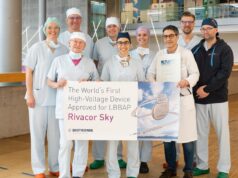
Ilan Goldenberg (director, Department of Cardiology, The Chaim Sheba Medical Center and director, Coordinating Center of the Israeli Association for Cardiovascular Trials, Israel) has coordinated investigator sponsored studies in the evaluation of cardiac rhythm devices in Israel. He chaired a session on investigator sponsored research at the 12th International Dead Sea Symposium (IDSS) on Innovations in Cardiac Arrhythmias and Device Therapy (Tel Aviv, Israel, 3–5 March) and spoke to Cardiac Rhythm News about the subject.
What is investigator sponsored research and how does it differ from company sponsored trials?
Investigator sponsored research is dedicated to advancing research topics that are initiated and of interest to the physician/researcher. These studies are generally designed to address a relevant clinical question regarding the risk benefit of certain devices or drug therapies in specific populations. In contrast, company sponsored research is generally dedicated to advancing indications to certain therapies that are of interest to the company. These studies, if successful, usually result in increased market sales (due to expanding indications).
The incremental value of investigator initiated research is the ability it gives to provide specific details on the efficacy and risk of therapies, and data on how to increase the yield of these therapies.
An important difference for the physician/researcher who conducts investigator sponsored research is the fact that he/she receives an unrestricted grant to conduct a study from the company and then assumes responsibility for all aspects of the trial. In contrast, in company sponsored trials, the company still takes responsibility for important logistics (including contracting with centres, institutional review board (IRB) submissions, translations, monitoring of centres, and even liability).
Could we say that this is a novel modality of research? We normally see more company sponsored trials.
This modality is not new, but in recent years there has been an increase in the utilisation of this type of studies since companies have started to move away from sponsoring large clinical trials, and are now trying to focus more on specific topics and their implementation in a real world setting.
Could you tell us your experience working on investigator sponsored research projects?
Our research center – the Israeli Association for Cardiovascular Trials – currently conducts about 30 investigator initiated studies. Approximately half are in the field of electrophysiology – mostly related to device studies.
In the field of electrophysiology our studies include registries designed to evaluate the efficacy of implantable cardioverter defibrillators/cardiac resynchronisation therapy (ICD/CRT) in a real world setting, randomised clinical trials designed to identify ways to increase the benefit of CRT in heart failure patients, a study on left atrial appendage occluders, and an extended follow-up of the MADIT-CRT trial that will be presented in the late breaking sessions of the upcoming American College of Cardiology meeting.
Despite the difficulty and logistics associated with independently conducting these types of studies (without the assistance of a large company), I think that the data provided by these studies is important, and has indeed resulted in major publications to date and even changes in national management strategies in our country.
How does investigator sponsored research in Europe compare with investigator sponsored research in USA?
There are certain unique complexities related to initiated studies in both Europe and in the USA. These are related in Europe to different regulations of Ethics Committees (EC) in different countries and the need for translations of contracts and EC/IRB forms. On the other hand, conducting investigator initiated research in the USA is usually more expensive and is associated with more legal/liability complexities. Therefore, challenges that need to be dealt by the coordination centre exist in each location.
What are the key considerations physicians should follow to get industry sponsorship in their research applications?
I think that investigator sponsored research can provide an important pathway to advance young researchers and physicians who are interested in the field of clinical research. I would recommend focusing on an important clinical question that in their opinion could advance medical science and the management of patients. Following this, the next step would be to develop a short proposal and discuss the idea with a relevant company to obtain independent research funds. If there is mutual interest, the likelihood to obtain research funds for the study is relatively high.









